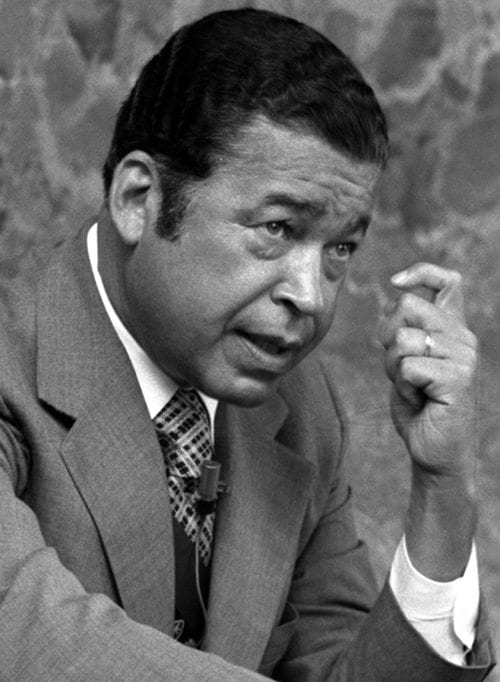

Edward W. Brooke III
Sen. Edward W. Brooke will always remain a hero to veterans of the battle for civil rights. With the passage of the Civil Rights Act of 1964, blacks gained the right to sue in court for racial discrimination in employment, education and places of public accommodation. But people really wanted more than that. They wanted to believe that American society was more receptive to black participation at the highest level. Ed Brooke’s achievements indicated that a favorable shift in possible opportunities was occurring. His successes were encouraging.
Only 18 months before the 1964 Civil Rights Act became law, Brooke was sworn in as the attorney general of Massachusetts. He was the first black attorney general in U.S. history. Then just two years after passage of the Civil Rights Act, Brooke began campaigning for the U.S. Senate in Massachusetts. In 1967 he was sworn in as the first black U.S. senator in a general election. He served in the Senate until 1979.
Brooke dared to defy the odds for winning a Senate campaign, even though black voters, with only 2 percent of the population, could not be of great political assistance. Success at the polls was a challenge with a remote possibility of success, but Brooke was well qualified. He was keenly intelligent, extraordinarily gracious and endowed with natural and persuasive oratorical skills. Brooke set a standard for competence that very few can attain.
Although Brooke was born and raised in Washington, D.C. and graduated from Howard University, he came to Boston after service as an army officer in World War II to attend Boston University Law School. Brooke’s professional career unfolded in Boston. His first law firm was located in Roxbury on Humboldt Ave. near Waumbeck St., and he lived on Harrishof St. and later on Crawford St.
Brooke began his political career by running for state representative from Roxbury in 1950. Early contact with outstanding statesmen like former Gov. Christian Herter and U.S. Sen. Leverett Saltonstall induced him to become a Republican. In those days, the Republicans were not the party of the Dixiecrats. The Republicans were happy to have an outstanding candidate to challenge the Democratic stronghold in Boston.
Brooke lost, but that campaign made him aware that he enjoyed politics and had the disposition to star in that profession. His understanding of human nature persuaded him that whites would vote for a competent black candidate for public office, just as blacks had voted for whites over the years.
In 1960, the year that John F. Kennedy ran for president, Brooke ran against Kevin White for Massachusetts secretary of state. With Kennedy at the top of the ticket, Brooke lost as expected, but he tallied 1,095,054 votes and emerged as a formidable political figure. Brooke’s next move was to become chairman of the Boston Finance Commission to establish his reputation for fighting corruption in preparation for a run for attorney general.
Brooke’s strategy was successful. He was elected as the state’s corruption-fighting attorney general in 1962. That success enhanced his campaign for the U.S. Senate in 1966. As a U.S. senator, Brooke became one of the nation’s foremost policy makers, challenging party leaders when necessary. Brooke led the fight to oppose President Richard Nixon’s nomination to the U.S. Supreme Court of Clement Haynsworth and G. Harrold Carswell, two bigoted jurists.
An expert on housing development issues, Brooke will be remembered as the author of the policy that restricts the rent for low income housing to 25 percent of a tenant’s income. Brooke became a leader of the so-called Rockefeller Republicans who were committed to making the nation’s great economic power benefit all citizens.
The quality of Brooke’s public service has enhanced the status and reputation of the committed professional American politician. He will always be remembered here as an adopted and loyal Roxbury man.
Brooke is survived by his wife of 35 years, the former Anne Fleming, and their son Edward, and Brooke’s daughters from his first marriage to Remigia, Remi Cynthia Brooke Goldstone and Edwina Helene Brooke Petit, as well as four grandchildren.


![Banner [Virtual] Art Gallery](https://baystatebanner.com/wp-content/uploads/2024/04/Cagen-Luse_Men-at-store-e1713991226112-150x150.jpg)



